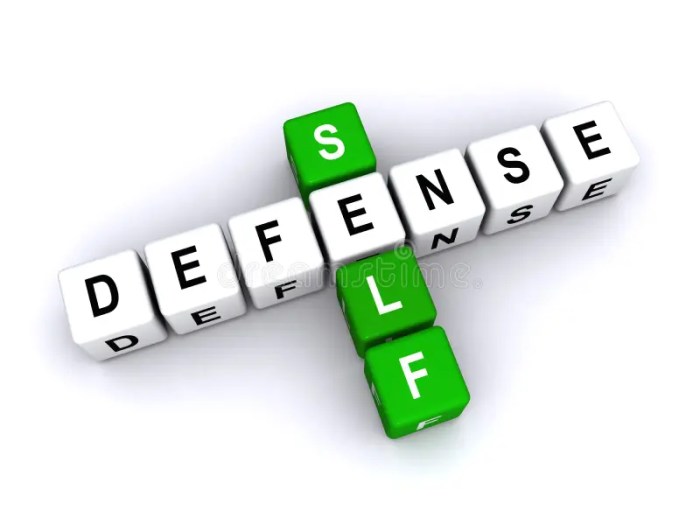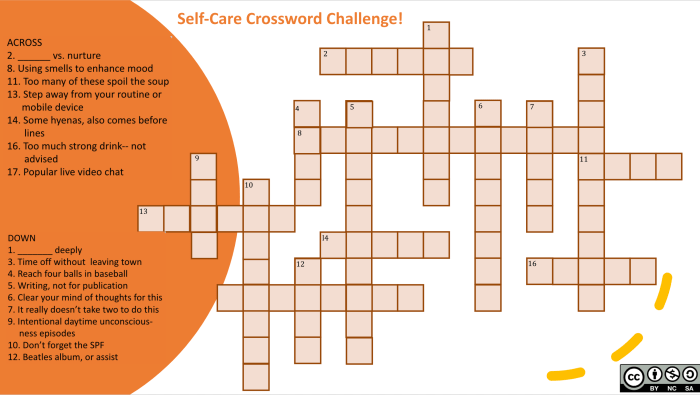Dive into the fascinating world of aid in self defense crossword and uncover its intriguing intricacies. From understanding the legal frameworks to exploring various methods of assistance, this article delves into the complexities of aiding in self defense.
As we unravel the legal considerations, ethical dilemmas, and training opportunities surrounding this topic, you’ll gain invaluable insights into the nuances of aiding in self defense.
Definitions of Aid in Self Defense

Within the context of the legal system, “aid in self defense” refers to the act of providing assistance to another individual who is engaged in defending themselves against an imminent threat of harm. This assistance can take various forms, including physical help, verbal support, or providing means of escape.
Actions that constitute aiding in self defense typically involve assisting the individual in repelling the attacker, preventing further harm, or facilitating their escape from the dangerous situation. Examples include physically intervening to stop the attacker, providing verbal encouragement or guidance, or using an object to create a distraction.
On the other hand, actions that do not constitute aiding in self defense may include providing assistance to the attacker, encouraging the use of excessive force, or participating in the attack itself. It’s important to note that the legal implications of aiding in self defense can vary depending on the specific circumstances and applicable laws.
Legal Implications
Individuals who aid in self defense may face legal charges if their actions are deemed to be excessive or unlawful. In some cases, aiding in self defense may be considered a crime if it involves the use of deadly force or if the person providing assistance is not acting in defense of themselves or another person.
However, there are also legal defenses available to individuals who aid in self defense. These defenses may include the “defense of others” or “necessity” defenses, which allow individuals to use reasonable force to protect themselves or others from imminent harm.
Methods of Aiding in Self Defense: Aid In Self Defense Crossword
In the face of a self-defense situation, there are numerous ways to provide assistance beyond physical intervention. These methods range from verbal support to tactical advice, each with its own effectiveness and ethical implications.
Physical Assistance
Providing physical assistance is the most direct method of aiding in self defense. This can involve intervening physically to restrain the attacker, creating a barrier between the victim and the attacker, or using force to subdue the attacker.
Physical assistance is highly effective in incapacitating the attacker and preventing further harm to the victim. However, it also carries the highest risk of escalation and unintended consequences, as the use of force can potentially lead to injury or even death.
Verbal Support
Verbal support involves using words to deter the attacker, de-escalate the situation, or provide encouragement to the victim. This can include shouting, commanding the attacker to stop, or offering words of comfort and reassurance to the victim.
Verbal support is less effective than physical assistance in stopping an attack, but it can be useful in preventing the situation from escalating further. It is also a relatively low-risk method, as it does not involve the use of force.
Tactical Advice
Tactical advice involves providing the victim with guidance on how to defend themselves effectively. This can include advice on how to avoid or evade an attack, how to use their environment to their advantage, or how to use self-defense techniques.
Tactical advice can be highly effective in helping the victim to defend themselves successfully. It is also a relatively low-risk method, as it does not involve the use of force.
Ethical Considerations
Aiding in self defense carries with it several ethical considerations. These include the potential for escalation, the risk of unintended consequences, and the duty to intervene.
It is important to weigh the potential benefits of aiding in self defense against the potential risks before intervening. In some cases, it may be more appropriate to call for help or to try to de-escalate the situation verbally rather than to use force.
Legal Considerations for Aiding in Self Defense

When providing aid in self defense, it is crucial to understand the legal principles that govern such actions. These principles vary across jurisdictions, so it is essential to be aware of the specific laws applicable in your area.
One of the key legal principles is the “Castle Doctrine,” which generally allows individuals to use deadly force in defense of their homes or other dwellings. Similarly, “Stand Your Ground” laws permit individuals to use deadly force in self defense without first attempting to retreat.
Need help with that aid in self defense crossword? Take a break and check out this ap biology unit 8 cheat sheet to refresh your memory on essential concepts. After you’ve mastered those, come back and tackle that crossword puzzle with renewed confidence.
Differences in Legal Treatment, Aid in self defense crossword
The legal treatment of aiding in self defense varies across jurisdictions. Some jurisdictions have adopted the “imperfect self defense” doctrine, which reduces the charges against a defendant who used excessive force but acted reasonably in self defense. Other jurisdictions may have specific laws that address the use of force by third parties in self defense situations.
Case Law and Legal Precedents
There is a body of case law and legal precedents that provide guidance on the legal principles governing aid in self defense. One notable case is Castle Rock v. Gonzales(2005), in which the Supreme Court ruled that the police do not have a constitutional duty to protect individuals from harm.
Training and Resources for Aiding in Self Defense
Empowering oneself with the knowledge and skills to aid in self defense is a crucial step towards ensuring personal safety and the well-being of others. Formal training programs and resources provide individuals with the necessary foundation to respond effectively in self defense situations.
Proper training is paramount to ensure the safety and legality of aiding in self defense. Certified instructors can guide individuals through comprehensive programs that cover techniques, legal considerations, and ethical responsibilities. These programs equip individuals with the confidence and competence to act appropriately and minimize the risk of harm to themselves or others.
Types of Training Programs
- Self-Defense Classes:Offered at community centers, martial arts studios, and fitness facilities, these classes teach basic self-defense techniques, situational awareness, and de-escalation strategies.
- First Aid and CPR Training:Equips individuals with the skills to provide immediate medical assistance in case of injury or medical emergencies.
- Law Enforcement and Security Training:Provides specialized training for individuals working in law enforcement or security roles, covering topics such as use of force, crowd control, and legal liability.
Tips for Aiding in Self Defense Without Formal Training
While formal training is highly recommended, individuals who do not have access to it can still aid in self defense by following these tips:
- Be Aware of Your Surroundings:Pay attention to your environment and identify potential threats. Avoid isolated areas or situations that make you feel uncomfortable.
- Trust Your Instincts:If something feels wrong, listen to your gut and remove yourself from the situation. Do not ignore warning signs.
- Seek Help:If you witness or are involved in a dangerous situation, call for help immediately. Contact law enforcement or trusted individuals who can provide assistance.
Answers to Common Questions
What constitutes aiding in self defense?
Aiding in self defense involves providing assistance to someone who is acting in self-defense, such as physical support, verbal encouragement, or tactical advice.
What are the potential legal implications of aiding in self defense?
Aiding in self defense may result in charges of assault, battery, or even murder if the assistance provided exceeds the bounds of what is considered reasonable.
Is there a difference in legal treatment of aiding in self defense in different jurisdictions?
Yes, the legal treatment of aiding in self defense varies across jurisdictions, with some states adopting the “Castle Doctrine” or “Stand Your Ground” laws that provide greater protection to those aiding in self defense.